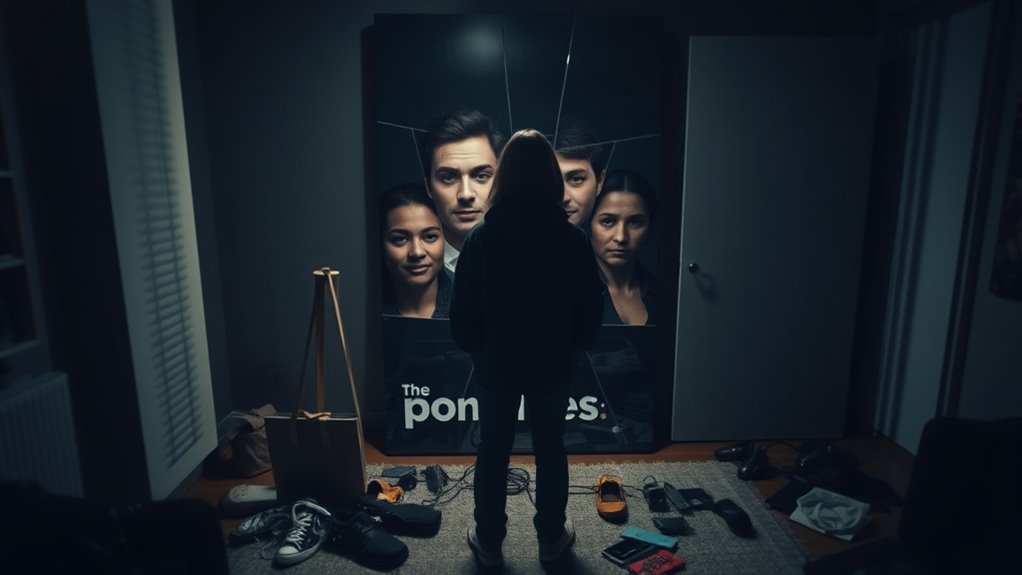If you have BPD, you might notice intense fears of abandonment and unstable relationships, often swinging between idealization and devaluation. Your moods could shift quickly, making you feel happy, anxious, or angry with little warning. Impulsive actions like risky spending, unsafe sex, or substance use might happen to cope with overwhelming feelings. You could also experience identity confusion, feeling unsure of who you are. Recognizing these signs can help you understand when to seek support; explore more to learn how to manage these challenges.
Key Takeaways
- Intense fear of abandonment leading to clingy or frantic efforts to avoid real or imagined rejection.
- Rapid mood swings and emotional instability lasting minutes or hours, often unrelated to external events.
- Unstable self-image with frequent shifts in identity, self-worth, and goals.
- Engaging in impulsive, risky behaviors like reckless spending, unsafe sex, or substance use.
- Turbulent relationships marked by idealization, devaluation, and difficulty maintaining trust.
Fear of Abandonment and Its Impact

Fear of abandonment is a core feature of BPD that profoundly influences how you behave and relate to others. You might go to great lengths to prevent separation or rejection, often reacting intensely to perceived threats. Even ambiguous social cues can trigger feelings of impending rejection, leading to desperate efforts to maintain connections. This fear can cause you to cling tightly or become excessively anxious about losing people you care about. You may find yourself constantly monitoring others’ actions or words, interpreting minor misunderstandings as signs of rejection. These reactions often stem from a deep-seated need for reassurance and acceptance. As a result, your relationships can become turbulent, marked by a cycle of clinginess and fear of being abandoned, which fuels ongoing emotional distress.
Emotional Instability and Mood Fluctuations

You may notice that your emotions shift rapidly and unpredictably, often without any clear reason. These intense mood swings can last minutes or hours, making it hard to stay grounded. Feelings of happiness, irritability, anxiety, or shame can come and go suddenly. You might experience frequent episodes of rage, sorrow, panic, or deep shame, often unrelated to external events. These fluctuations can leave you feeling empty or lonely, even when things seem fine.
- Your moods may change without warning, confusing those around you.
- You might feel overwhelmed by feelings of shame or emptiness.
- Emotional reactions are intense but usually short-lived.
- The unpredictability can make it difficult to maintain stability in daily life.
Patterns of Unstable and Intense Relationships

People with BPD often experience relationships as highly unstable and emotionally intense. You might find yourself idealizing someone one moment, feeling deeply connected, then rapidly devaluing them the next. These shifts create turbulence, making it difficult to maintain steady bonds. You may crave closeness but struggle to trust others, leading to frequent conflicts or sudden withdrawals. Your feelings toward loved ones can swing from adoration to anger or disappointment without warning. This pattern stems from intense fear of abandonment, causing you to cling tightly or push others away out of self-protection. You might also experience extreme reactions to perceived rejection, amplifying relationship instability. As a result, your relationships often feel unpredictable and exhausting, impacting your ability to build secure, lasting connections.
Impulsivity and Engagement in Risky Behaviors

You might find yourself engaging in reckless spending, unsafe sex, or substance use as a way to cope with intense emotional pain. These risky behaviors often feel like quick relief but can lead to more problems down the line. Recognizing these patterns is key to understanding how impulsivity impacts your life.
Reckless Spending Habits
Reckless spending habits are a common manifestation of impulsivity in individuals with Borderline Personality Disorder (BPD). When you feel overwhelmed or emotionally unstable, you might turn to shopping as a quick fix, often without considering the consequences. This behavior can lead to financial problems and feelings of guilt or shame afterward. You might find yourself making impulsive purchases to soothe intense emotions or fill a sense of emptiness. These spending sprees are usually unpredictable and serve as temporary relief. Recognizing this pattern is essential for understanding your emotional responses.
- Using shopping to escape painful feelings
- Buying items impulsively without planning
- Accumulating debt due to unrestrained spending
- Feeling regret or shame after impulsive purchases
Unsafe Sexual Encounters
Impulsivity in BPD often leads to engaging in risky behaviors, including unsafe sexual encounters. You might find yourself engaging in sex impulsively, driven by intense emotions or a need for validation. These encounters are often unplanned and may involve partners you barely know or situations that feel reckless. Such behaviors are usually attempts to manage feelings of emptiness, loneliness, or emotional pain. You may seek the temporary relief or validation that risky sex provides, but it often leaves you feeling more vulnerable or regretful afterward. This impulsivity can escalate, affecting your self-esteem and safety. It’s a way to escape inner turmoil momentarily, but it tends to perpetuate a cycle of emotional instability and risky decision-making.
Substance Use Risks
Individuals with Borderline Personality Disorder often engage in substance use as a way to cope with intense emotions and inner turmoil. You might turn to drugs or alcohol impulsively to numb feelings of emptiness or overwhelm. This risky behavior can provide temporary relief but often worsens emotional instability. Substance use increases the likelihood of reckless decisions, self-destructive acts, and relationship problems. It also heightens your risk of legal issues, health complications, and addiction.
- Substance use serves as an escape, masking emotional pain temporarily.
- Impulsive actions during emotional crises lead to dangerous choices.
- Risky behaviors, including substance abuse, amplify instability in life and relationships.
- These actions often reinforce feelings of shame and low self-worth.
Identity Disturbance and Self-Image Shifts

A core feature of BPD is a persistent and unstable sense of self, where your self-image and personal identity can change rapidly and unpredictably. You might find yourself shifting between different roles, values, or beliefs without clear reasons. This instability can lead to confusion about who you are, affecting your goals and relationships. You may also experience feelings of worthlessness or self-hatred, alternating with moments of confidence.
| Aspect | Effect |
|---|---|
| Self-perception | Fluctuates between positive and negative feelings |
| Identity consistency | Difficulty maintaining a stable sense of who you are |
| Values and goals | Rapidly change, leading to confusion and frustration |
| Self-esteem | Often low, with episodes of feeling nonexistent or unworthy |
Cognitive and Perceptual Disturbances

The unstable self-image in BPD can sometimes lead to distorted perceptions and moments of confusion about reality. During these episodes, your thoughts may feel disconnected, and you might experience brief paranoia or dissociation. These mental shifts serve as coping mechanisms when you’re overwhelmed or stressed. You might feel detached from your surroundings or yourself, making it hard to trust your perceptions. These episodes can last minutes to hours, disrupting your ability to function socially or emotionally. Recognizing these disturbances is essential, as they often feel real but are temporary. They can cause you to misinterpret others’ intentions or your environment, fueling emotional instability.
Unstable self-image in BPD causes brief perceptual distortions and feelings of dissociation, impacting trust and emotional stability.
- Paranoia under stress, leading to mistrust
- Feeling disconnected from thoughts or feelings
- Fluctuating perceptual distortions
- Temporary loss of contact with reality
Recognizing the Signs: When to Seek Help

Recognizing when to seek help for BPD is essential, especially during episodes of intense emotional distress or cognitive disturbances. If you notice yourself or someone else experiencing persistent mood swings, impulsive behaviors, or unstable relationships that cause distress, it’s time to seek support. Warning signs include self-harm urges, threats of suicide, or severe paranoia. Early intervention can prevent escalation and improve outcomes. Use the following table as a guide:
| Warning Signs | Emotional Indicators | Actions to Take |
|---|---|---|
| Self-harm or suicidal thoughts | Intense fear of abandonment | Reach out to a mental health professional |
| Severe mood swings | Feelings of emptiness or shame | Seek immediate help if danger is imminent |
| Unstable relationships | Sudden distrust or anger | Contact crisis services if needed |
Don’t ignore these signs; professional help can make a difference.
Frequently Asked Questions
How Does BPD Affect Daily Functioning and Personal Relationships?
BPD can profoundly disrupt your daily life and relationships. You might struggle with intense mood swings, making it hard to focus or maintain routines. Your relationships could feel unstable, swinging between closeness and withdrawal, leading to conflicts and mistrust. Impulsive behaviors may cause you to take risks or self-sabotage. You often feel empty or unsure of yourself, which impacts your self-esteem and ability to connect consistently with others.
What Are Common Early Warning Signs of BPD in Teenagers?
In teenagers, you might notice a strong fear of abandonment causing clingy behaviors or emotional outbursts. They may experience rapid mood swings, feeling happy one moment and deeply sad the next. Relationships can be intense and unstable, swinging between idealization and devaluation. Impulsive actions like reckless spending, risky behaviors, or sudden changes in identity are common. These early signs reflect emotional instability and a fragile sense of self, often appearing during adolescence.
Can BPD Symptoms Improve With Therapy or Medication?
Yes, your BPD symptoms can improve with therapy and medication. Therapy like Dialectical Behavior Therapy (DBT) helps you learn emotional regulation, reduce impulsivity, and build healthier relationships. Medications can also help manage specific symptoms such as mood swings, anxiety, or depression. While complete remission is possible for some, many find significant relief and better stability through consistent treatment, leading to improved daily functioning and relationships.
How Is BPD Different From Other Mood or Personality Disorders?
Did you know about 75% of people with BPD seek treatment? BPD differs from other disorders because of its intense fear of abandonment, rapid mood swings, and unstable relationships. Unlike mood disorders like depression, BPD’s emotional shifts are more unpredictable and tied to interpersonal issues. Its core features include identity disturbance and impulsivity, setting it apart from other personality disorders that usually have more fixed patterns.
What Coping Strategies Help Manage BPD Symptoms Effectively?
To manage BPD symptoms, you should practice mindfulness to stay grounded during emotional swings, and develop healthy coping skills like journaling or grounding techniques. Seek therapy, such as Dialectical Behavior Therapy (DBT), to learn emotion regulation and distress tolerance. Establish routines and build a strong support system to reduce feelings of abandonment and instability. Remember, consistent self-care and professional help are key to managing BPD effectively.
Conclusion
Understanding these signs helps you recognize when you’re struggling with BPD. Some experts suggest that emotional instability might be an adaptive response to past trauma, rather than a disorder itself. While this theory is debated, acknowledging your feelings and seeking help can guide you toward stability. Remember, with support and awareness, you can manage these symptoms and improve your well-being. Don’t wait—your journey to understanding starts with recognizing these signs.








